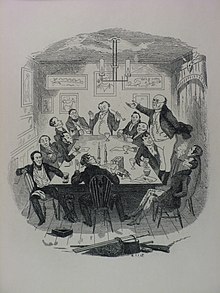The Pickwickier

Die Pickwickier , in German translation initially Die Pickwicker , original title The Posthumous Papers of the Pickwick Club , better known as The Pickwick Papers , is the first novel by Charles Dickens . The work was published as a serialized novel in 20 parts monthly between March 1836 and October 1837. The humorous novel that Dickens published when he was 23 made him famous practically overnight.
content

The main character of the novel is the scholar Samuel Pickwick, founder and president of the Pickwick Club . In order to gain new knowledge, he undertakes numerous trips within England together with club members Tracy Tupman, Augustus Snodgrass and Nathaniel Winkle. Charles Dickens describes the existing adventures almost episodically and with a lot of humor and situation comedy. By referring to the (fictional) minutes of the Pickwick Club, he gives his story authenticity.
At the beginning of their travels, the four Pickwickies get to know Alfred Jingle, who is exposed as a con man as the story progresses. Again and again the four friends are taken to the manor farm Mr. Wardles in Dingley Dell. The farmer-savvy Sam Weller also plays a central role as Mr. Pickwick's loyal servant. His attitude causes a misunderstanding between the scholar and his landlady, Mrs. Bardell, which eventually brings all three to London Fleet Prison . Here in particular, Dickens, whose father himself sat in London guilty prison for some time , shows the untenable social conditions. The law firm Dodson & Fogg represents the unrewarding role of the judiciary. The novel ends with a happy ending for almost everyone involved.
Aspects of interpretation
Central themes of the novel are friendship and forgiveness, which are carried out using the eccentric character of Samuel Pickwick. Towards the end of the novel, he pays for the debts of Mrs. Bardell and Alfred Jingle, although both of them have caused him trouble beforehand. Pickwick's servant Sam Weller , on whose frequent use of sagas the expression Wellerism goes back, has far more in common with his master than an employment relationship. With the use of some finesse, he even follows him against his will into the guilty prison.
As a paternal mentor, Pickwick enables his (younger) club members Tupman, Snodgrass and Winkle to go on an educational trip where two of the three get to know their future wives. He also actively supports his servant Sam Weller in his marriage ambitions. As soon as his protégés want to go their own way with their wives, Pickwick loosens the close ties of friendship and dissolves his club.
Mr. Wardles' servant Joe Joseph suffers from obesity and constant drowsiness. This clinical picture is known as Pickwick syndrome due to the description in the novel .
24 pages of the manuscript for the Pickwick Papers - and thus the largest part still in existence - are in the possession of the Rosenbach Museum & Library in Philadelphia. The art dealer ASW Rosenbach bought the manuscript in two parts in 1923 and 1928 respectively.
Film adaptations
- 1913 short silent film with John Bunny
- 1921 The Adventures of Mr Pickwick , silent film with Frederick Volpe and Hubert Woodward
- 1951 Mr. Pickwick , first sound film with James Hayter and Harry Fowler
- 1985 BBC film adaptation with Nigel Stock in the lead role
musical
Dickens' novel also provided the template for the musical Pickwick by Leslie Bricusse (text) and Cyril Ornadel (music), which premiered in London in 1963 and was also seen on Broadway in 1965.
expenditure
- Charles Dickens: Die Pickwickier (Original title: The Posthumous Papers of the Pickwick Club , translated by Gustav Meyrink , afterword by Walter Kluge). Diogenes , Zurich 2002, ISBN 978-3-257-21405-5 .
- Fischer Klassik, Frankfurt am Main 2012, ISBN 978-3-596-90378-8 .
- Charles Dickens: The Pickwickier. From Boz (Dickens). New from the English by Dr. Carl Kolb . Stuttgart 1855 ( digitized version of the 2nd edition in the Internet Archive )
Individual evidence
- ↑ Edwin Wolf (Ed.): Legacies of Genius: A Celebration of Philadelphia Libraries . The Library Company of Philadelphia, Philadelphia 1988, ISBN 1-151-45471-0 , pp. 78-79.



